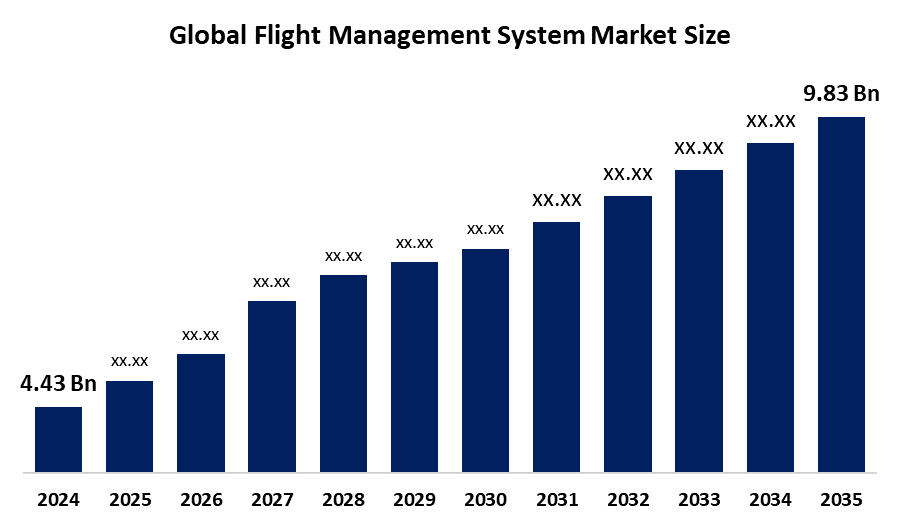
Top 50 Companies in Flight Management System (FMS) Market: Statistics Report Till 2035
RELEASE DATE: Sep 2025 Author: Spherical InsightsRequest Free Sample Speak to Analyst
Description
According to a research report published by Spherical Insights & Consulting, The Global Flight Management System (FMS) Market Size is projected To Grow from USD 4.43 Billion in 2024 to USD 9.83 Billion by 2035, at a CAGR of 7.51% during the forecast period 2025–2035. The major companies in the sector have made a number of advancements in the introduction of sophisticated flight management system (FMS)s, which support the expansion of the market globally.
Introduction
The demand for effective and secure air travel is being driven by the growth of the global aviation industry. In order to improve safety and cut expenses, airlines are placing a higher priority on operational optimization, which is driving up demand for sophisticated flight management systems (FMS). For example, Honeywell announced in June 2024 that it had agreed to pay Advent International about $1.9 billion in cash to buy CAES Systems Holdings LLC. In addition to strengthening Honeywell's defense technology solutions across land, sea, air, and space, this acquisition, which is valued at roughly 14 times the projected 2024 EBITDA, will add new electromagnetic defense capabilities for comprehensive radio frequency signal management, improving overall flight management. Real-time decision-making is made possible by these systems, which automate flight planning and performance monitoring. Airlines are investing in FMS solutions that increase accuracy and dependability in response to strict safety rules and growing passenger volumes. The FMS market is anticipated to expand as airlines implement technologies that improve operational integrity and passenger confidence, as safety continues to be a major priority for both customers and regulators.
Navigate Future Markets with Confidence: Insights from Spherical Insights LLP
The insights presented in this blog are derived from comprehensive market research conducted by Spherical Insights LLP, a trusted advisory partner to leading global enterprises. Backed by in-depth data analysis, expert forecasting, and industry-specific intelligence, our reports empower decision-makers to identify strategic growth opportunities in fast-evolving sectors. Clients seeking detailed market segmentation, competitive landscapes, regional outlooks, and future investment trends will find immense value in the full report. By leveraging our research, businesses can make informed decisions, gain a competitive edge, and stay ahead in the transition toward sustainable and profitable solutions.
Unlock exclusive market insights - Download the Brochure now and dive deeper into the future of the Flight Management System (FMS) Market.
Flight Management System (FMS) Market Size & Statistics
- The Market Size for Flight Management System (FMS) Was Estimated to be worth USD 4.43 Billion in 2024.
- The Market Size is Going to Expand at a CAGR of 7.51% between 2025 and 2035.
- The Global Flight Management System (FMS) Market Size is anticipated to reach USD 9.83 Billion by 2035.
- North America is expected to generate the highest demand during the forecast period in the Flight Management System (FMS) Market
- Asia-Pacific is expected to grow the fastest during the forecast period in the Flight Management System (FMS) Market.

Regional growth and demand
Asia-Pacific is expected to grow the fastest during the forecast period in the flight management system (FMS) market. China's burgeoning aviation industry and rising passenger demand are driving the country's flight management system (FMS) market's expansion. New airplane models and airport infrastructure investments are propelling the use of cutting-edge FMS technologies. China's pledge to cut carbon emissions is pushing airlines to adopt more effective procedures, setting up the FMS market for expansion as the sector modernizes and boosts operational effectiveness.
North America is expected to generate the highest demand during the forecast period in the flight management system (FMS) market. The market for flight management systems in North America is expanding rapidly due to significant regional investments in aviation infrastructure and technology. The need for sophisticated FMS solutions has grown among commercial airlines and business jet operators in the US as a result of the drive for modernization and efficiency. The United States has established itself as a leader in the adoption of cutting-edge FMS technology thanks to its governmental backing for environmental and safety improvements as well as its increasing emphasis on sustainability.
Top 5 trends in the Flight Management System (FMS) Market
- Increasing Adoption of Advanced Automation and AI
- Integration with Connected and Cloud-Based Systems
- Growing Demand for Fuel Efficiency and Emission Reduction
- Expansion of Performance-Based Navigation (PBN)
- Retrofitting and Upgrading of Legacy Aircraft FMS
1. Increasing Adoption of Advanced Automation and AI
Flight management systems are increasingly integrating automation and AI-driven algorithms to optimize route planning, fuel consumption, and operational safety. These technologies reduce pilot workload and improve decision-making, contributing to enhanced flight efficiency and reliability.
2. Integration with Connected and Cloud-Based Systems
FMS solutions are evolving to support real-time data exchange with ground control and airline operation centers via secure cloud connectivity. This connectivity enables dynamic flight plan adjustments and better coordination, improving operational flexibility and reducing delays.
3. Growing Demand for Fuel Efficiency and Emission Reduction
With stricter environmental regulations and rising fuel costs, airlines are leveraging FMS innovations to optimize flight trajectories that minimize fuel burn and carbon emissions. This focus supports sustainable aviation initiatives and cost savings.
4. Expansion of Performance-Based Navigation (PBN)
The increasing use of PBN allows for more precise and efficient airspace use, reducing congestion and enhancing safety. Adoption of PBN is driving FMS upgrades to comply with regulatory mandates and better manage increasingly crowded skies.
5. Retrofitting and Upgrading of Legacy Aircraft FMS
To extend aircraft life and comply with modern standards, airlines are investing in retrofitting older fleets with advanced FMS technology. This trend supports enhanced operational capabilities and safety without the costs of new aircraft acquisition.
Empower your strategic planning:
Stay informed with the latest industry insights and market trends to identify new opportunities and drive growth in the flight management system (FMS) market. To explore more in-depth trends, insights, and forecasts, please refer to our detailed report.
Top 25 Companies Leading the Flight Management System (FMS) Market
- Honeywell International Inc.
- Thales Group
- General Electric Company (GE Aviation)
- Rockwell Collins (now part of Collins Aerospace)
- Leonardo-Finmeccanica S.p.A
- Garmin Ltd.
- Universal Avionics Systems Corporation
- Esterline Technologies Corporation
- Navtech, Inc.
- Lufthansa Systems GmbH & Co. KG
- Jeppesen Sanderson Inc.
- Navtech Inc.
- L3Harris Technologies
- BAE Systems
- Safran Electronics & Defense
- Elbit Systems
- Meggitt PLC
- UTC Aerospace Systems
- Moog Inc.
- Cobham plc
- RUAG Aviation
- Astra Aerospace
- Kongsberg Gruppen
- Panasonic Avionics Corporation
- Spirit AeroSystems
1. Honeywell International Inc. – Charlotte, North Carolina, USA
Honeywell International is a global leader in flight management systems, offering advanced FMS software and hardware that enhance aircraft navigation, fuel efficiency, and operational safety. The company’s innovative FMS products feature predictive navigation algorithms, boosting fuel savings by up to 7% for commercial airlines. Honeywell integrates AI and automation to reduce pilot workload and optimize flight planning across a wide range of aircraft types. Their extensive avionics portfolio supports both commercial and military aviation, reflecting robust industry adoption. Honeywell’s continuous R&D and strategic partnerships position it as a vital player in the evolving flight management system market.
2. Thales Group – Paris, France
Thales Group is a key player in the flight management system market, known for its sophisticated FMS hardware and AI-driven decision support systems. Based in Paris, Thales provides solutions primarily for military and commercial aviation sectors, emphasizing enhanced navigation precision and situational awareness. The company recently launched next-generation flight management systems designed to integrate seamlessly with digital cockpits and connected aircraft ecosystems. Thales’ advanced FMS technologies help improve mission-critical operations and adapt to evolving regulatory requirements, securing its stronghold in the global market.
3. RTX Corporation – Arlington, Virginia, USA
RTX Corporation, through its Collins Aerospace division, delivers state-of-the-art flight management systems that combine software innovation with hardware reliability. RTX’s FMS offerings focus on integrating cloud connectivity, real-time data analytics, and predictive maintenance, enhancing operational efficiency for commercial and defense aircraft. The company’s leadership in avionics ensures that it remains at the forefront of flight management technologies, addressing the growing demand for smarter, more connected cockpit solutions. RTX’s global presence and extensive customer base underscore its influence in the flight management system market.
4. Garmin Ltd. – Olathe, Kansas, USA
Garmin Ltd. is a major player specializing in aviation navigation and flight management systems that cater to general aviation, business aircraft, and emerging urban air mobility markets. Known for user-friendly interfaces and reliable GPS-based navigation solutions, Garmin’s FMS products offer comprehensive route planning, terrain awareness, and real-time weather updates. The company’s commitment to innovation in integrated cockpit systems supports enhanced safety and operational efficiency. Garmin’s expanding footprint in both commercial and private aviation sectors makes it a significant contributor to the flight management system industry.
5. General Electric (GE) Aviation – Boston, Massachusetts, USA
GE Aviation designs and manufactures flight management systems that optimize aircraft performance by integrating navigation, communication, and engine data. Based in Boston, GE leverages advanced software algorithms and hardware integration to improve flight efficiency, safety, and regulatory compliance. The company’s FMS products are widely used in commercial and military aircraft, supporting fuel optimization and predictive analytics. GE Aviation’s consistent investment in research and development ensures it remains a prominent player driving innovation in the flight management system market.
Are you ready to discover more about the flight management system (FMS) market?
The report provides an in-depth analysis of the leading companies operating in the global flight management system (FMS) market. It includes a comparative assessment based on their product portfolios, business overviews, geographical footprint, strategic initiatives, market segment share, and SWOT analysis. Each company is profiled using a standardized format that includes:
Company Profiles
- Honeywell International Inc.
- Business Overview
- Company Snapshot
- Products Overview
- Company Market Share Analysis
- Company Coverage Portfolio
- Financial Analysis
- Recent Developments
- Merger and Acquisitions
- SWOT Analysis
- Thales Group
- General Electric Company (GE Aviation)
- Rockwell Collins (now part of Collins Aerospace)
- Leonardo-Finmeccanica S.p.A
- Garmin Ltd.
- Universal Avionics Systems Corporation
- Esterline Technologies Corporation
- Navtech, Inc.
- Others.
Conclusion
The Flight Management System (FMS) Market Size is experiencing robust growth driven by increased global air travel and the rising demand for efficient, fuel-saving avionics technologies. Key trends include advancements in automation, predictive maintenance, and satellite-based navigation that enhance flight safety, operational efficiency, and regulatory compliance. North America currently leads the market due to strong aviation infrastructure and investments, while the Asia-Pacific region is rapidly expanding with growing commercial airline fleets.
About the Spherical Insights & Consulting
Spherical Insights & Consulting is a market research and consulting firm which provides actionable market research study, quantitative forecasting and trends analysis provides forward-looking insight especially designed for decision makers and aids ROI.
Which is catering to different industry such as financial sectors, industrial sectors, government organizations, universities, non-profits and corporations. The company's mission is to work with businesses to achieve business objectives and maintain strategic improvements.
CONTACT US:
For More Information on Your Target Market, Please Contact Us Below:
Phone: +1 303 800 4326 (the U.S.)
Phone: +91 90289 24100 (APAC)
Email: inquiry@sphericalinsights.com, sales@sphericalinsights.com
Contact Us: https://www.sphericalinsights.com/contact-us
Need help to buy this report?